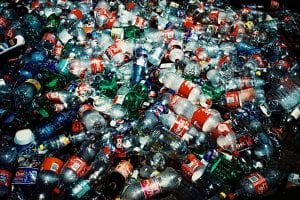10 actions travelers can take to be part of the global plastic waste solution, not the problem

Fifty years ago, plastic products were being hailed as great technical innovations. Today, however, the world is working to dramatically reduce global plastic consumption, to reduce plastic waste on land and in the seas to stop its devastating effects on the environment.
So, what’s the plastic waste problem? Is it the hoax that some politicians rant and rave against?
Here are some critical facts about plastic waste:
• 236,000 metric tons of microplastic waste are thrown into the ocean annually, according to oceanographer and climate scientist, Dr. Erik van Sebille. Microplastics, when ingested by marine animals, can cause gut blockage and physical injury. They impact marine life growth and reproduction that seriously threatens our ocean-based food sources and our environment.
• By 2050 there will be more plastic in the oceans than there are fish (by weight).
• Nearly two million single-use plastic bags are distributed worldwide every minute.
• According to an article in the prestigious publication Science, when coral comes in contact with marine borne plastic it has an 89 percent likelihood of becoming diseased. Coral reefs are home to more than 25 percent of marine life, according to the Coral Reef Alliance.
• 8.3 billion metric tons of plastic have been produced since plastic was introduced in the 1950s. We know that virtually every piece of plastic that’s ever been manufactured still exists in some shape or form, except for a small amount that was incinerated.
Clearly, the global problem of plastic waste is real. Those who say otherwise aren’t being honest.
Take these 10 steps toward environmental sustainability
Use reusable beverage bottles —
Don’t drink from disposable plastic water bottles. Bring a reusable bottle to fill with water or another beverage while traveling. I use an insulated bottle to prevent sweating and keep my drink hot or cold. Collapsible bottles are great space savers.
READ ALSO: How to travel responsibly and sustainably today
Use a reusable shopping bag —
Stop using single use plastic bags. Pack a reusable shopping bag for your journeys. I use a rip-stop nylon bag that holds 50 pounds and is large enough to hold 2–3 plastic bags worth of groceries. It folds into a self-contained, flat 5×5 inch pouch when packed.
Bring your own reusable bottles of bathroom products —
Don’t use the small plastic bottles of shampoo and soap provided by hotels. I fill those products into my own three ounce, rugged, squeezable, silicone bottles. They can be packed in my carry-on liquids baggie.
Stop using destination water quality as an excuse to use plastic water bottles —
While there are a few spots around the globe that require travelers to use bottled water, generally, you can make water safe at almost any destination with a water filter and a quality ultraviolet light based water sterilizer. Generally, the devices, if used properly, can protect you from some viruses, bacteria and protozoa, plus risks of botulism, cholera, dysentery and typhoid.
 Avoid plastic toothbrushes —
Avoid plastic toothbrushes —
Every year in the U.S alone, Americans throw away an estimated one billion plastic toothbrushes. There are two basic alternatives. Consider using a bamboo-based toothbrush. Bamboo toothbrushes are eco-friendly, ergonomic and inexpensive. Personally, I use a toothbrush that uses a small, long-lasting brush head on a reusable handle. Either way, you’re reducing plastic waste.
Avoid single use plastic bags for packing clothes in your luggage —
Packing neatly, in layers, in bags that keep your belongings clean helps you get through airport security and assists you in staying organized. I stopped using plastic bags to pack for my trips long ago. I’ve replaced them with more useful packing cubes (padded and unpadded), compression cubes and bags, shoe bags and boot bags. While using a grocery store bag may be less expensive, the cost of these cubes and bags quickly drops as you use them for trip after trip.
Refuse to use plastic straws and stirrers —
If you like straws or stirrers for your soda, cocktails and other beverages, when offered plastic ones, refuse them. Suggest the hotel, bar or restaurant gets biodegradable alternatives or bring your own stainless steel straw. They’re inexpensive and last for years. They require cleaning.
ALSO IN TRAVELERS UNITED: Will flight shaming come to the USA? Why it shouldn’t
Use reusable utensils for snacks and road meals —
Don’t bring disposable plastic knives, forks and spoons for eating on the road or in your room. I bring utensil sets made of high-temperature nylon on my journeys and wash them after use.
Stay at eco-friendly hotels —
Make your reservations at hotels committed to sustainability, including minimizing single-use plastic products. Ask if they have filtered water stations to refill guests’ personal reusable water bottles. Do they use an alternative to plastic straws at their bars and dining rooms?
Flying and cruising —
Your favorite airlines and cruise lines should reduce or better yet, eliminate single use plastics. Tell them to improve their eco-sustainability to keep you as a returning customer. The more travelers demand that, the more eco-friendly the companies will become.
Travel currently produces significant plastic waste. Each traveler must take responsibility for it. Use eco-friendly travel service suppliers and personally take action to reduce their own plastic waste.
After many years working in corporate America as a chemical engineer, executive and eventually CFO of a multinational manufacturer, Ned founded a tech consulting company and later restarted NSL Photography, his photography business. Before entering the corporate world, Ned worked as a Public Health Engineer for the Philadelphia Department of Public Health. As a well known corporate, travel and wildlife photographer, Ned travels the world writing about travel and photography, as well as running photography workshops, seminars and photowalks. Visit Ned’s Photography Blog and Galleries.



